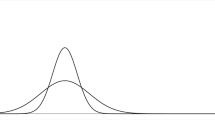Abstract
Maynard Smith’s defenses of adaptationism and of the value of optimization theory in evolutionary biology are both criticized. His defense does not adequately respond to the criticism of adaptationism by Gould and Lewontin. It is also argued here that natural selection cannot be interpreted as an optimization process if the objective function to be optimized is either (i) interpretable as a fitness, or (ii) correlated with the mean population fitness. This result holds even if fitnesses are frequency-independent; the problem is further exacerbated in the frequency-dependent context modeled by evolutionary game theory. However, Eshel and Feldman’s new results on “long-term” evolution may provide some hope for the continuing relevance of the game-theoretic framework. These arguments also demonstrate the irrelevance of attempts by Intelligent Design creationists to use computational limits on optimization algorithms as evidence against evolutionary theory. It is pointed out that adaptation, natural selection, and optimization are not equivalent processes in the context of biological evolution.
Similar content being viewed by others
References
Bishop D.T. and Cannings C. (1978). A generalized war of attrition. J. Theor. Biol. 70: 85–124
Behera N. (1996). Variational principles in evolution. Bull. Math. Biol. 58: 175–202
Crow J.F. and Kimura M. (1970). An Introduction to Population Genetics Theory. Minneapolis, Burgess
Dawkins R. (1996). Climbing Mount Improbable. London, Viking/Penguin
de Jong K. (1993). Genetic algorithms are NOT function optimizers. In: Whitley L.D., (eds). Foundations of Genetic Algorithms. San Mateo, CA, Morgan Kaufmann, pp. 5–17
Dembski W.A. (2002). No Free Lunch: Why Specified Complexity Cannot be Purchased without Intelligence. Lanham, MD, Rowman and Littlefield
Eshel I. and Feldman M.W. (2001). Optimality and evolutionary stability under short-term and long-term selection. In: Orzack S.H. and Sober E. (eds), Adaptationism and Optimality. Cambridge UK, Cambridge University Press, pp. 161–190
Ewens W.J.(1969). With additive fitness, the mean fitness increases. Nature 221: 1076
Ewens W.J. (1989). An interpretation and proof of the fundamental theorem of natural selection. Theor. Popul. Biol. 36: 167–180
Ewens W.J. (1992). An optimizing principle of natural selection in evolutionary population genetics. Theor. Popul. Biol. 42: 333–346
Fisher R.A. (1930). The Genetical Theory of Natural Selection. Oxford, Clarendon Press
Forster M.R. 1999. Notice: No Free Lunches for Anyone, Bayesians Included. <http://www.no-free-lunch.org/Fors99.pdf>. Accessed: 14 February 2005
Godfrey-Smith P. (2001). Three kinds of adaptationism. In: Orzack S.H. and Sober E. (eds). Adaptationism and Optimality. Cambridge, UK, Cambridge University Press, pp. 335–357
Gould S.J. and Lewontin R.C. (1979). The Spandrels of San Marco and the Panglossian paradigm. Proc. R. Soc. Lond. B 205: 581–598
Haldane J.B.S. (1928). Possible Worlds and Other Papers. New York, Harper
Holland J. (1975). Adaptation in Natural and Artificial Systems: An Introductory Analysis with Applications to Biology, Control, and Artificial Intelligence. Ann Arbor, University of Michigan Press
Karlin S. (1975). General two locus selection models: some objectives, rules and interpretations. Theor. Popul. Biol. 7: 364–398
Lanczos C. (1959). The Variational Principles of Mechanics. Toronto, University of Toronto Press
Lewontin R.C. (1961). Evolution and the theory of games. J. Theor. Biol. 1: 383–403
Lewontin R.C. (1974). The Genetic Basis of Evolutionary Change. New York, Columbia University Press
Lewontin R.C.(1977). “Adaptation”. Encyclopedia Einaudi Turin 1: 198 –214
Lewontin R.C. (1978). Adaptation. Sci. Am. 239: 212–230
Lewontin R.C. (1979). Fitness, survival, and optimality. In: Horn D.J., Mitchell R. and Stairs G.R. (eds) Analysis of Ecological Systems. Columbus, Ohio State University Press, pp. 3–21
Lewontin R.C. (1991). Facts and the factitious in natural sciences. Crit. Inq. 18: 140–153
Maynard Smith J. (1978). Optimization theory in evolution. Annu. Rev. Ecol. Syst. 9: 31–56
Maynard Smith J. (1982). Evolution and the Theory of Games. Cambridge, UK, Cambridge University Press
Maynard Smith J. and Szathmáry E. (1995). The Major Transitions in Evolution. Oxford, Oxford University Press
Mayr E. (1983). How to carry out the adaptationist program. Am. Nat. 121: 324–334
Michod R.E. (1999). Darwinian Dynamics: Evolutionary Transitions in Fitness and Individuality. Princeton, Princeton University Press
Moran P.A.P. (1964). On the nonexistence of adaptive topographies. Ann. Hum. Genet. 27: 383–393
Parker G.A. and Maynard Smith J.(1990). Optimality theory in evolutionary biology. Nature 348: 27–33
Perakh M. 2003. The No Free Lunch Theorems and Their Applications to Evolutionary Algorithms. <http://www.nctimes.net/∼ ∼mark/bibl_science/orr_demb_NFL.htm>. Accessed: 13 February 2005.
Perakh M. (2004). Why there is a free lunch after all: William Dembski’s wrong answer to irrelevant questions. In: Young M. and Edis T. (eds) Why Intelligent Design Fails: A Scientific Critique of the New Creationism. New Brunswick, Rutgers University Press, pp. 153–171
Quenette P.-Y. and Gerard J.-F. (1992). Does frequency-dependent selection optimize fitness?. J. Theor. Biol. 159: 381–385
Reeve H.K. and Sherman P.W. 1999. Adaptations: Meanings. In: Nature Encyclopedia of Life Sciences. John Wiley, Chichester. http://www.els.net/ [doi:10.1038/npg.els.0001707].
Scheuer P.A.G. and Mandel S.P.H. (1959). An inequality in population genetics. Heredity 31: 519–524
Svirezhev Y.M. (1972). Optimum principles in population genetics. In: Ratner V.A. (ed) Studies on Theoretical Genetics. Novosibirsk, USSR Academy of Science, pp. 86–102
Shahshahani S. 1979. A new mathematical framework for the study of linkage and selection. Memoirs Am. Math. Soc. 17: 211
Wolpert D.H. and Macready W.G. (1997). No free lunch theorems for optimization. IEEE Trans. Evol. Comput. 1: 67–82
Wright S. (1932). The roles of mutation, inbreeding, crossbreeding and selection in evolution. In: Jones D.F., (ed), Proceedings of the Sixth International Congress of Genetics. I. Monisha, WI, Brooklyn Botanic Garden, pp. 356–366
Wright S. (1967). Surfaces’ of selective value. Proc. Natl. Acad. Sci. USA 58: 165–172
Zeeman E.C. (1981). Dynamics of the evolution of animal conflicts. J. Theor. Biol. 89: 249–270
Author information
Authors and Affiliations
Corresponding author
Additional information
It is a pleasure to dedicate this paper to the memory of John Maynard Smith. Thanks are due to James Justus and Samir Okasha for comments on an earlier draft.
Rights and permissions
About this article
Cite this article
Sarkar, S. Maynard Smith, optimization, and evolution. Biol Philos 20, 951–966 (2005). https://doi.org/10.1007/s10539-005-9017-3
Received:
Accepted:
Published:
Issue Date:
DOI: https://doi.org/10.1007/s10539-005-9017-3




